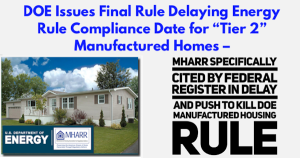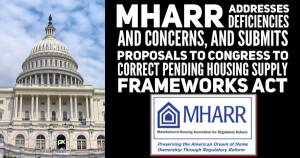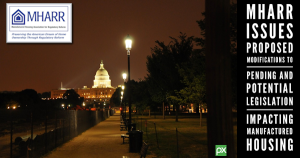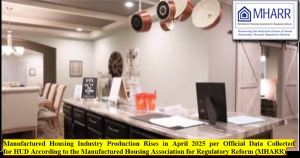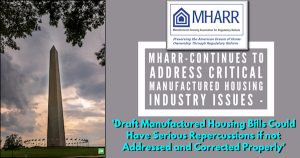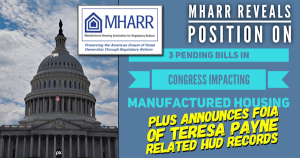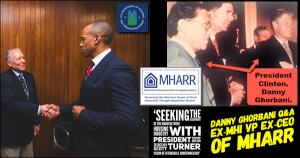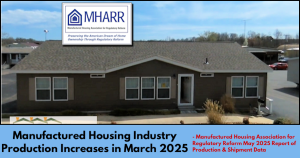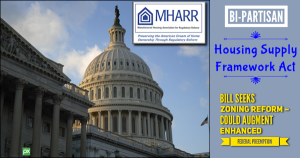MHARR Appeals HUD Stonewalling On MHCC FOIA
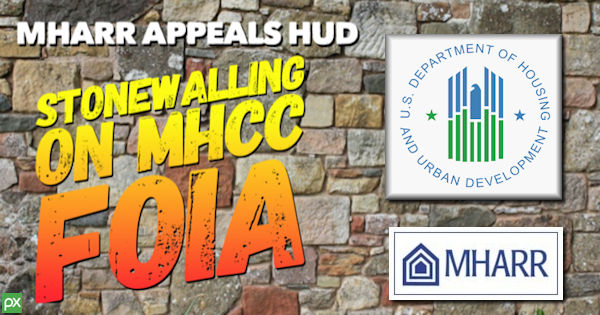
Washington, D.C., January 2, 2020 – The Manufactured Housing Association for Regulatory Reform (MHARR) has appealed (copy attached) a HUD decision refusing to disclose information related to the selection of members to serve on the vitally important Manufactured Housing Consensus Committee (MHCC).
In a Freedom of Information Act (FOIA) request filed in January 2016, MHARR sought the disclosure of all applications for appointment to the statutory MHCC – regardless of whether the applicant was actually appointed by HUD – submitted to the Department since January 2008. The purpose of MHARR’s request was to: (1) determine whether all MHCC appointees had been selected by HUD in accordance with allapplicable requirements and criteria of the Manufactured Housing Improvement Act of 2000; and (2) to determine whether there is evidence of past or present discrimination by HUD, or potential HUD bias, against any individual(s), group, class, or interest in the selection (or non-selection) of MHCC members. This information and related assessment is of crucial importance given the central role of the MHCC in the HUD regulatory process and is entirely consistent with the policies of President Trump regarding potential abuses of federal regulatory power and related processes.
HUD, in its September 20, 2019 response to this request, disclosed the nomination applications submitted by individuals previously appointed to the MHCC, but refused to produce applications submitted by persons who have not been appointed to MHCC membership, citing FOIA Exemption 6, which is designed to protect personal privacy interests.
In its administrative appeal, MHARR asserts that non-appointed nominees have no reasonable expectation of privacy in their nomination forms that is legitimately distinguishable from those who have been appointed to the MHCC, and that all such applications must be disclosed in order to determine if HUD, in the MHCC selection process, is excluding certain parties and/or interests from full representation, or is discriminating or otherwise playing favorites in its selection process. The significance and relevance of this inquiry has only grown in light of recent actions by HUD to unduly and improperly restrict the participation rights of non-MHCC members in MHCC debates and in the MHCC’s consideration of proposals that are of vital interest to both the industry and consumers. Such increasing efforts to silence participation by interested parties is reminiscent of similar activity by the Department in connection with the failed and bankrupt “Manufactured Housing Advisory Council,” which Congress, in the 2000 reform law, terminated in favor of a fully-functional and fully-accountable MHCC. Anystep backward in that direction is wholly unacceptable to MHARR and will be targeted for appropriate action.
In the event that its administrative appeal is denied, MHARR has the option to take this matter to federal court in order to seek full disclosure of the requested documents, at which time it could – and would — seek depositions and related discovery of HUD program regulators and other HUD officials connected with the withholding of such information.
December 18, 2019
VIA FIRST-CLASS MAIL AND CERTIFIED MAIL RETURN RECEIPT REQUESTED
U.S. Department of Housing and Urban Development
Attention: FOIA Appeals
Office of Ethics and Appeals Law Division Office of General Counsel
451 Seventh Street, S.W.
Suite 2130
Washington, D.C. 20410
Re: Freedom of Information Act Request-Appeal
FOIA Control Number: 16-FI-HQ-00762
Dear Sir or Madam:
The Manufactured Housing Association for Regulatory Reform (MHARR), pursuant to 24 C.F.R. 15.109, hereby appeals the September 20, 2019 denial[1]by the U.S. Department of Housing and Urban Development (HUD) of certain specified aspects of a Freedom of Information Act (FOIA) request submitted to HUD by MHARR on January 15, 2016.[2]
INTRODUCTION
In relevant part, MHARR’s FOIA request sought the disclosure of: “All applications for appointment to the Manufactured Housing Consensus Committee [MHCC/Committee] regardless of whether any such applicant has been appointed to membership on the MHCC, received by HUD and/or the MHCC Administering Organizations(s) (AO), under contract to HUD, from January 1, 2008, to the present.”[3]
On September 20, 2019, more than three yearsafter the filing of MHARR’s straightforward request, HUD responded with a determination which provided documents pertaining only to applicants already appointed to the MHCC, while refusing to produce the applications (either in whole or redacted) of individuals not then appointed to the Committee. In relevant part, HUD’s determination letter states: “I have determined that the enclosed documents are appropriate for release with certain excisions made pursuant to Exemption 6 of the FOIA, 5 U.S.C. 552(b)(6). The enclosed documents are the applications of those individuals who were appointed to the MHCC. I have also determined that applications received from those who were not appointed to the MHCC are being withheld in full pursuant to Exemption 6 of the FOIA.”[4](Emphasis added).
MHARR, through this appeal, seeks reversal of the determination to withhold the nomination applications of individuals not previously appointed to the MHCC with respect to disclosure of their identity, alleged qualifications for appointment and alleged qualifications for interest group affiliation.
ARGUMENT
- THE MHCC IS A PUBLIC BODY WITH SPECIFIC PUBLIC
REGULATORY FUNCTIONS PRESCRIBED BY STATUTE
The Manufactured Housing Consensus Committee is a public body established by Congress as part of the Manufactured Housing Improvement Act of 2000 (Public Law 106-569). Pursuant to section 604(a)(3) of that law,[5]the Committee is substantively tasked with providing “periodic recommendations to the [HUD] Secretary to adopt, revise and interpret the federal manufactured housing construction and safety standards” under authority of the Act, as well as “procedural and enforcement regulations” under the same statute. Similarly, section 604(b)(6) of the 2000 Act[6]requires that “any statement of policies, practices, or procedures relating to construction and safety standards, regulations, inspections, monitoring or other enforcement activities” under the federal manufactured housing program, that seeks to “implement, interpret, or prescribe law or policy by the Secretary is subject” to prior MHCC review and recommendation pursuant to section 604(a) of the Act as amended.
The MHCC, accordingly, plays a direct and vital role in the federal manufactured housing program and in the establishment of standards, rules, regulations and related policies under authority of the program as amended by the 2000 Act. Each and every manufactured housing standard, enforcement regulation, interpretation and policy as specified by statute, prior to adoption by the Secretary pursuant to notice and comment rulemaking, mustbe presented to (or by) the MHCC and recommended by the MHCC for adoption, absent a bonafide“emergency” as defined by Congress.[7]
As established by Congress, the MHCC is described as “a committee … composed of twenty-one voting members appointed by the Secretary … from among individuals who are qualified by background and experience to participate in the work of the consensus committee,” as well as one non-voting member appointed by the Secretary of HUD.[8](Emphasis added). Section 604(a)(3)(D) of the 2000 law further provides that “each member of the consensus committee shall be appointed … to ensure equal representation” of “producers,” “users” of manufactured housing, and “general interest” representatives and “public officials.”[9]The law, moreover, requires a “proper balance of interests on the consensus committee”[10]and directs the Secretary, “in appointing members,” to “ensure that all directly and materially affected interests have the opportunity for fair and equitable participation” in the work of the MHCC.[11](Emphasis added).
As an integral component of the HUD rulemaking process for the adoption, amendment, and interpretation of federal manufactured housing standards, enforcement regulations and related policies, practices and procedures, the 2000 law specifically provides that “all meetings of the [MHCC] shall be open to the public” and that “the consensus committee shall provide advance notice of each meeting” to both the Secretary and to the public through publication of advance notice “of each such meeting” in the Federal Register.”[12]Further, nominations for appointment to the MHCC have consistently been solicited and pursued via public notice published by HUD in the Federal Register.[13]
- AS A PUBLIC BODY WITH SOLELY PUBLIC FUNCTIONS, MHCC
NOMINEES HAVE NO LEGITIMATE EXPECTATION OF PRIVACY
Disclosure of the identity and alleged qualifications of nominees for appointment to the MHCC[14]– whether appointed to membership prior to the request for such information pursuant to FOIA ornot– is warranted and indeed mandated under multiple theories and factors relevant to FOIA and its overriding objective of governmental transparency. See, National Labor Relations Board v. Robbins Tire & Rubber Co., 437 U.S. 214, 242 (1978) (“The basic purpose of FOIA is to ensure an informed citizenry, vital to the functioning of a democratic society, needed to check against corruption and to hold the governors accountable to the governed.”) Furthermore, the distinction that HUD seeks to establish in this case, between disclosure of the MHCC application forms of those already appointed as MHCC members and those not yet appointed as MHCC members is specious and logically absurd based on the facts of this case, and should be rejected.
FOIA Exemption 6, by its express terms, protects information concerning individuals contained in “personnel and medical files and similar files the disclosure of which would constitute a clearly unwarranted invasion of personal privacy.”[15]The Federal Court of Appeals for the District of Columbia Circuit has stated, however, that “under Exemption 6, the presumption in favor of disclosure is as strong as can be found anywhere in the [FOIA] Act.” See,Multi Ag Media, L.L.C. v. U.S. Department of Agriculture, 515 F.3d 1224, 1227 (D.C. Cir. 2008). Seealso, Consumers’ Checkbook Center v. U.S. Department of Health and Human Services, 554 F.3d 1046, 1057 (D.C. Cir. 2009) (FOIA’s “presumption favoring disclosure … is at its zenith under Exemption 6”). The burden, moreover, rests with the withholding agency – in this instance HUD — to establish and justify the applicability of the exemption and any withholding of responsive documents pursuant thereto. See, Lawyers’ Committee for Civil Rights v. Department of the Treasury, 2008 WL 4482855 (N.D. Cal. 2008). The test in each instance, is whether a protectable privacy interest exists and whether disclosure of the requested document(s) would “constitute a clearly unwarranted invasion of such personal privacy” when balanced against the “public’s right to disclosure.” See, Berger v. Internal Revenue Service, 288 F.3d 829, 832 (3d Cir. 2008) (“To determine whether the exemption applies, courts balance the public interest in disclosure against the privacy interest protected by the exemption”).
In order to determine, then, whether Exemption 6 warrants nondisclosure, “courts require that agencies engage in … a four-step analysis: first, determine whether the information at issue is a personnel, medical or ‘similar’ file; second, determine whether there is a significant privacy interest in the requested information; third, evaluate the requester’s asserted FOIA public interest in disclosure; and finally, if there is a significant privacy interest in nondisclosure and a FOIA public interest in disclosure, balance those competing interests to determine whether disclosure ‘would constitute a clearly unwarranted invasion of personal privacy.’” See, “Department of Justice Guide to the Freedom of Information Act,” Exemption 6 (October 4, 2019) at 2. Each step of this analysis, moreover, “is dependent upon the prior step being satisfied.” Id.
Even if it were assumed arguendothat MHCC applications are “similar” to personnel or medical files for purposes of Exemption 6 – which they are not – applicants would still not have a legitimate or reasonable expectation of privacy or confidentiality in either their identity or alleged qualifications based on the specific facts of this case and the very standard that HUD itself has established in its initial determination concerning this matter. As a result, the application of Exemption 6 to this matter necessarily fails on step two of the mandated four-step analysis and would still fail on the latter elements of that analysis even if they were deemed necessary.
Specifically, MHCC applicants are not and have not been assured of privacy or confidentiality by HUD in the MHCC nomination process, and can have no legitimate or reasonable expectation of privacy or confidentiality in submitting their respective nomination applications. Quite the contrary, everyMHCC applicant is necessarily aware, when submitting their MHCC nomination form to HUD via the MHCC Administering Organization, that the MHCC is a statutorily-mandated publicbody, with statutorily-mandated publicfunctions and statutorily-mandated publicproceedings and that, at a minimum, if selected for membership by HUD, their identity would be disclosed, open-to and known by the public, and their application form would be disclosable to the public under FOIA without exemption or redaction, as determined by HUD in this case. From this analysis it necessarily follows that assuming the HUD selection process for MHCC members is proper, legitimate and in full compliance with the 2000 law – as it should and, indeed, mustbe – then allMHCC applicants have an equalopportunity for appointment to the MHCC as a matter of law, and must necessarily submit their respective nominations with the expectation and knowledge, equal to and no different from past appointees, that their nomination applications and all information contained therein would be subject to public disclosure. As a result, the legal distinction which HUD seeks to draw between appointed and non-appointed applicants has no valid or legitimate factual or logical basis with regard to applicants’ reasonable expectations. Insofar as everyMHCC applicant is aware of the possible disclosure of their application data, then noMHCC applicant can have a reasonable expectation of the privacy or confidentiality of that data. Seee.g.,People for the American Way Foundation v. National Park Service, 503 F. Supp. 2d 284, 306 (D.D.C. 2007) (“Disclosing the mere identity of individuals who submitted voluntarily submitted comments … does not raise the kind of privacy concerns protected by Exemption 6.”) Moreover, since service on the MHCC is voluntary and non-compensated, and not in the nature of employment, there is not even an arguable basis for asserting the confidentiality of that information in any event.
Put differently, any assertion of a privacy or confidentiality interest on the part of MHCC applicants is specious. First, each applicant, in submitting an application to HUD, is or should be aware from both the 2000 Act and from HUD’s initial determination in this case, that their identity and, indeed, their entire MHCC nomination application, would necessarily be disclosed if appointed. Second, every applicant, has or should have — in a legitimate MHCC appointment process — an equal chance and expectation of being appointed, which would necessarily result in the disclosure of their entire application upon request under the very standard that HUD has enunciated in this case. Therefore, assuming a legitimate and lawful selection process, no nominee can have a reasonable expectation of privacy whether immediately selected for MHCC membership or not. This is particularly the case insofar as MHCC applications submitted by nominees not immediately selected by HUD are maintained on file by HUD for future consideration and possible appointment.[16]
Under the facts of this case, therefore, MHCC applicants, whether appointed to date or not, have no cognizable, let alone “substantial”[17]privacy interest in their mere identity and alleged qualifications, as set forth in their nomination forms.
- EVEN IF A SUBSTANTIAL PRIVACY INTEREST EXISTS THAT INTEREST
IS OVVERRIDDEN BY THE PUBLIC INTEREST IN FULL DISCLOSURE
Moreover, even if it is assumed, arguendo, that currently non-appointed MHCC applicants have a “substantial” privacy interest in the identity and qualification information contained in their nomination forms and have a reasonable expectation of privacy with respect to that information (which they do not), that alleged interest, under the balancing test mandated pursuant to Exemption 6, is outweighed by the public interest in knowing who HUD has notselected for appointment (and their respective qualifications) versus the individuals that HUD hasselected for appointment and: (1) whether those selections are proper, lawful and in accordance with the MHCC membership qualification criteria of the 2000 Act; (2) whether those selection determinations properly and lawfully reflect a balance of interests as required by the 2000 Act; and (3) whether those selection determinations “ensure that all directly and materially affected interests have the opportunity for fair and equitable participation” in the work of the MHCC as required by the 2000 Act or, conversely, whether MHCC member selection determinations have been affected by other extraneous factors or reflect a pattern of bias, prejudice or discrimination against any relevant interest, group, class of members, or individuals in a manner that would violate either the 2000 Act or other applicable law.
Put differently, the public interest in the disclosures sought by MHARR relates specifically to evidence of HUD bias or discrimination in appointments to the MHCC, which could only be ascertained or proven through an open record and disclosure of those who have applied for membership, compared with those who have actually been appointed by HUD. Such a determination cannot be made based solely on an examination and analysis of nominees who have actually been appointed to the MHCC by HUD. Rather, it is essential that there be full disclosure of the entire candidate pool over the time period specified in MHARR’s FOIA request, in order to determine (or establish) if MHCC appointments have been valid and legitimate based on the criteria and requirements of the 2000 Act, or whether certain interests or segments of the industry, consumers, or others have been subjected to possible bias or either actual or defactodiscrimination. Only through such disclosure and analysis can it be determined whether HUD’s MHCC selections reflect a pattern or practice of discrimination against certain nominees, or classes of nominees, or types of interests, and whether the composition of the Committee, now, in the past, or in the future, was, is, or will be skewed, unbalanced or tilted against any relevant interest.
CONCLUSION
For all the foregoing reasons, MHARR requests that this appeal be granted and that HUD disclose MHCC nomination forms for all applicants since January 2008, showing the identity and alleged qualifications and affiliations of the said applicants.
Very truly yours,
Mark Weiss
President and CEO
cc: Hon. Ben Carson
Hon. Mick Mulvaney
Hon. Brian Montgomery
[1]See, Attachment 1 hereto.
[2]See, Attachment 2 hereto
[3]Id.
[4]Id.
[5]See, 42 U.S.C. 5403(a)(3).
[6]See, 42 U.S.C. 5403(b)(6).
[7]See, 42 U.S.C. 5403(b)(5).
[8]See42 U.S.C. 5403(a)(3)(B).
[9]See, 42 U.S.C. 5403(a)(3)(D).
[10]See, 42 U.S.C. 5403(a)(3)(E).
[11]See, 42 U.S.C. 5403(a)(3)(E)(i)(I). This “equitable” balance of interests was a key concern of the congressionally-established National Commission on Manufactured Housing, which established the basis for the MHCC in its 1994 Final Report to Congress. In relevant part, that report states: “The consensus, collaborative process for maintaining and developing the [federal standards] is a critical componentof the Commission’s mechanism for change. A balance of all interests on the consensus committee guarantees the integrity of the standards.” See, Final Report, National Commission on Manufactured Housing (August 1, 1994) at p. 41 (Emphasis added). Conversely, by necessary implication, a lack of balance or a materially skewed membership would necessarily undermine or impair the “integrity” of the standards and other Committee recommendations.
[12]See, 42 U.S.C. 5403(a)(3)(G).
[13]Seee.g., “Manufactured Housing Consensus Committee; Notice Inviting Nominations of Individuals to Serve on the Committee,” 76 Federal Register No. 242, December 16, 2011, at 78307; “Manufactured Housing Consensus Committee; Notice Inviting Individuals to Serve on the Committee,” 79 Federal Register No. 12, January 17, 2014 at 3219; “Manufactured Housing Consensus Committee; Notice Inviting Nominations of Individuals to Serve on the Committee,” 83 Federal Register No. 54, March 20, 2018 at 12200; “Manufactured Housing Consensus Committee (MHCC): Notice Inviting Nominations of Individuals to Serve on the Committee,” 84 Federal Register No. 207, October 25, 2019 at 57462.
[14]For purposes of this appeal, MHARR limits its request to disclosure of those portions of MHCC nomination forms – including those of nominees not yet selected – showing the name, alleged qualifications and, if applicable, business or group affiliation of the applicant. Conversely, MHARR does not seek – and would not object to the redaction of – personal information related to such applicants, including home addresses, home telephone numbers, or other disclosures of a purely personal nature, unrelated to the specific interests which MHARR seeks to protect in pursuing the disclosure of such documents.
[15]See, 5 U.S.C. 552(b)(6).
[16]Seee.g., 84 Federal Register No. 207, supraat 57463: “The Department will make appointments from nominations submitted in response to this Notice. Also, individuals that applied last year do not need to re-apply; pursuant to this notice those applications are on file and may be considered for future appointments.” (Emphasis added).
[17]See, Multi Ag Media, L.L.C. v. U.S. Department of Agriculture, supraat 1229: “The balancing analysis for FOIA Exemption 6 requires that we first determine whether disclosure … would compromise a substantial… privacy interest.” (Emphasis added).


